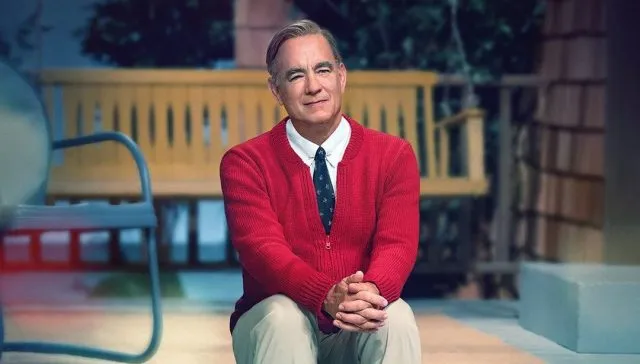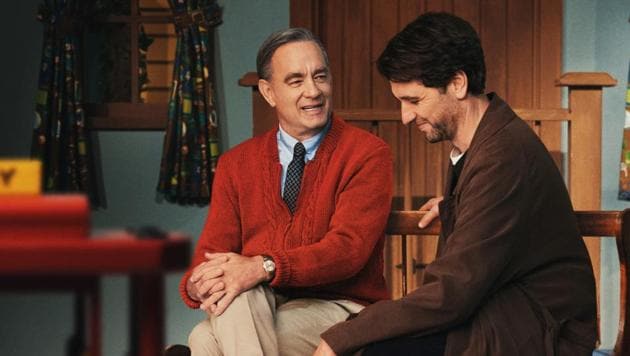A Beautiful Day in the Neighborhood: A beautiful twist on the biopic genre

A Beautiful Day in the Neighborhood (Marielle Heller, 2019) opens in one of the most beautiful ways inimaginable. The whole film is structured as a Fred Roger's show. It opens on Mr Rogers, brilliantly played by Tom Hanks, explaining what forgiving someone means - "to release someone from the feeling of anger we have towards them".
You have only seen him on screen for a couple of minutes but this is the most fascinating character you have ever seen. Surprisingly enough, in a biopic about Fred Rogers, he is not the lead. The story is based on an article about American heroes and the effect Fred Rogers had on the journalist.
The film follows Lloyd Vogel, a cynical journalist used to demolish the people he writes about. When he is assigned the piece about American heroes, the only person who has accepted to talk to him is Fred Rogers. As he meets with Rogers, his undealt emotional issues come back to the surface with each question Rogers asks him.

From the beginning, it is clear that there are unresolved issues between Vogel and his dad. Fred positions himself as a paternal figure for Vogel just as if he was guiding a child watching the show. Many times, Rogers explains how the show is a place for the children to deal with their negative feelings in a positive, to acknowledge they are here, to accept them and to understand they have the power. All of it is true when applied to adults. Vogel is taking the same steps a child would. Rogers uses the same ways he uses on the show.
No matter how perfect Vogel thinks Roger is, many times it is mentioned that he has become such a calm, composed person and that it is something he works on everyday. Rogers is not a perfect person, a "saint" but an imperfect human being like any of us. He admits it himself several times even if we never see it on screen. No matter how many times Vogel tries to trigger him whether it is mentioning how difficult it must have been for his sons or if he had returned to the show for money, Fred Rogers is disarming with his honesty and kindness. He acknowledges his shortcomings and shows gratitude for Vogel's questions.

The film never goes deep into what demons might have been Fred Rogers's but you see enough to understand there is something there. It is never trying to throw his name in the mud but subtle and delicate to make us understand he is human. The scene at the end where Rogers sits at the piano after finishing filming the show of the day. He starts playing before hitting all the grave notes on the piano at once.
The audience realises it is a reference to his answer as what to do when you are sad. It is a proof of his sadness without need for words and explanations. He then starts playing the tune again, all traces of sadness gone proving to everyone that you can choose. Choose to forgive, choose to move on, choose to see the positive and make the most of it.
There would not have been a better actor to embody Fred Rogers the way Tom Hanks did and not a better way to tell this story than showing how he helped not only children but adults. This film is complex, deep, thought-provoking but also light-hearted and feels like a big warm hum or a ray of sunshine in the middle of January. A beautiful day in the neighborhood is a beautiful biopic defying the conventions of the genre showing entertainment and stunning filmmaking can go hand in hand.